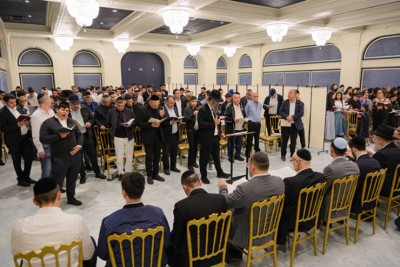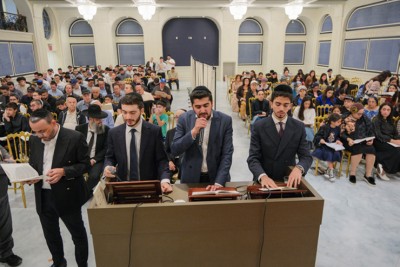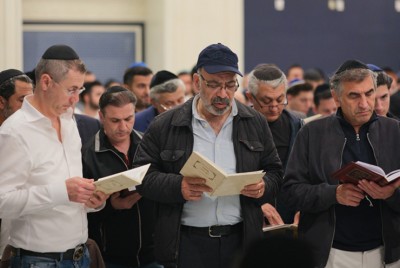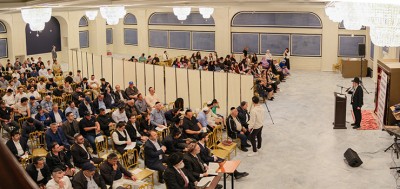







Just days before Yom Kippur, the Queens Jewish community came together for a night that was anything but ordinary. On Motza'ei Shabbat, September 27, the Beth Gavriel Banquet Hall was packed with men and women of all ages ready to press pause on life, reflect deeply, and prepare their hearts for the Yamim Nora’im — the Days of Awe.
The Grand Selichot event, hosted by Chazaq, was filled with relatable stories, powerful messages, emotional music, and heartfelt t'fillot. This wasn’t about just checking off a box before the holidays — it was about real change, real growth, and real connection with Hashem.
Drop The Baggage
Rabbi Tomer Zino started the night by reminding everyone that the only thing stopping people from growing is often themselves. Rabbi Zino shared a story about a man trying to get home. The man waits too long to buy his ticket, hesitates even as the train is leaving, and almost misses his chance. The conductor yells, “Drop your bags and jump!” Rabbi Zino explained that this is what teshuvah — repentance — is like.
“All year, we make excuses,” Rabbi Zino said. “We say, ‘I’m too busy,’ ‘I can’t change,’ or ‘It’s too late.’ But Hashem is telling us — drop the baggage holding you back and jump into the life you’re meant to live.”
Rabbi Zino shared another mashal about a husband who disappears right after his wedding, returning a year later with gifts as if nothing happened — only to disappear again. “We do this to Hashem,” Rabbi Zino explained. “We show up for Rosh Hashanah or Yom Kippur, cry and make promises — then disappear until next year. Real teshuvah means building a relationship that lasts beyond one day.”
Rabbi Zino also compared people to a man who used the same knife for cheese and meat — claiming one side was dairy and the other was meat. “We can’t be holy one day and go back to bad habits the next,” Rabbi Zino warned. “We must truly change.”
One of Rabbi Zino’s most powerful stories was about a man trying to push a heavy closet through a doorway. No matter how hard he tried, it wouldn’t fit — until people told him to set it down first. “We do the same thing,” Rabbi Zino said. “We try to walk into the next chapter of our lives without letting go of our past mistakes. To move forward, we have to leave some things behind.”
Rabbi Zino told a miracle story about a couple who prayed during a difficult medical situation. After adding a name and praying deeply, doctors were shocked — the problem vanished completely. “We hear stories like this all the time,” Rabbi Zino said. “But too often, we wait until something happens to us to change.”
Rabbi Zino even shared a story from an Israeli taxi driver about a soldier who almost died from a snakebite. After surviving, the soldier completely changed his life — but the driver did not, because it didn’t happen to him. “We laugh,” Rabbi Zino explained, “but too many of us only change when tragedy hits home. Don’t wait for that moment.”
Rabbi Zino compared people to circus elephants tied by thin ropes. When they’re babies, they can’t break free — and even when they grow stronger, they don’t try because they still believe they can’t. “We think we can’t change because we failed before,” Rabbi Zino said. “But Hashem says we can — we just have to try.”
And Rabbi Zino reminded everyone not to make empty promises — like the man who begs Hashem for a parking spot and then forgets once he finds one. “Real teshuvah is about action,” Rabbi Zino emphasized. “It’s about choosing to live differently every single day.”
Facing The Lion
Rabbi Ilan Meirov, Director of Chazaq and rav at Beth Gavriel, followed with an honest question: “If Rosh Hashanah and Yom Kippur decide who will live, succeed, and struggle — why aren’t we scared?” Rabbi Meirov explained that people treat these days like a zoo trip. “We’re not afraid of the lion because there’s a cage between us. Our distractions — money, popularity, pleasure, and especially our phones — create a barrier that blocks us from feeling the reality of judgment.”
Rabbi Meirov had the crowd pull out their phones and check their screen time. “Five hours a day!” Rabbi Meirov exclaimed. “That’s half your waking life — not with Hashem, not with your family, not improving yourself. The phone connects us to the world but disconnects us from what’s real.”
Rabbi Meirov challenged everyone to take small steps: wait until after birchot ha’shachar to look at your phone, put it away for 30 minutes during family time, and never use it in shul. “Be in control of your phone — don’t let it control you,” Rabbi Meirov urged.
To explain why small steps matter, Rabbi Meirov told a story about a bullied student who always chose five one-dollar bills over a hundred-dollar bill. Everyone laughed — but over time, he earned more money. “If we try to do too much at once, we’ll fail,” Rabbi Meirov explained. “But small, steady growth adds up.”
Rabbi Meirov ended with a challenge: “These devices are stealing our lives. They’re stopping us from being present. But we can take control. If we focus on Hashem, on fam
By Shabsie Saphirstein
Unforgettable Night Of Selichot And Change In Forest Hills
Typography
- Smaller Small Medium Big Bigger
- Default Helvetica Segoe Georgia Times
- Reading Mode


